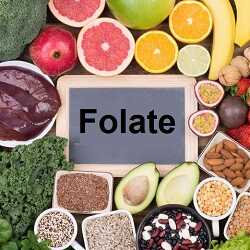Folate
 Folate, also known as vitamin B9 or folic acid (its synthetic form), is a crucial water-soluble vitamin that plays a fundamental role in various biological processes within the body. It is an essential nutrient, meaning that the body cannot produce it on its own and must obtain it from dietary sources.
Folate, also known as vitamin B9 or folic acid (its synthetic form), is a crucial water-soluble vitamin that plays a fundamental role in various biological processes within the body. It is an essential nutrient, meaning that the body cannot produce it on its own and must obtain it from dietary sources.
Folate has several important functions in the body, including:
DNA Synthesis and Cell Division: Folate is vital for the synthesis and repair of DNA, which is the genetic material in our cells. This is particularly important during periods of rapid cell division and growth, such as pregnancy and infancy.
Red Blood Cell Formation: Folate is essential for the formation of red blood cells, which are responsible for carrying oxygen from the lungs to the rest of the body. A deficiency in folate can lead to a type of anemia known as megaloblastic anemia, where red blood cells are larger than normal and less efficient at carrying oxygen.
Neurological Health: Folate plays a role in supporting the nervous system and promoting the health of nerve cells. It’s particularly important for the synthesis of neurotransmitters, which are chemicals that transmit signals between nerve cells.
Homocysteine Regulation: Folate, along with other B vitamins such as vitamin B12 and vitamin B6, helps to regulate the levels of homocysteine, an amino acid in the blood. High levels of homocysteine are associated with an increased risk of cardiovascular diseases.
Pregnancy and Fetal Development: Adequate folate intake is critical during pregnancy to prevent neural tube defects in the developing fetus. Neural tube defects can lead to serious abnormalities in the brain and spinal cord. Many healthcare professionals recommend that women who are planning to become pregnant or are pregnant take folic acid supplements to ensure proper fetal development.
Folate deficiency can have serious health implications, including anemia, fatigue, weakness, digestive issues, and an increased risk of neural tube defects in infants. Therefore, maintaining an adequate intake of folate through a balanced diet is essential for overall health.
Good dietary sources of folate include green leafy vegetables (such as spinach and kale), legumes (beans, lentils), citrus fruits, avocados, nuts, seeds, and fortified cereals. Cooking and processing foods can reduce the folate content, so consuming these foods in their fresh or lightly cooked forms is recommended.
In some cases, individuals may have difficulty absorbing or metabolizing folate properly due to genetic factors or underlying health conditions. In such cases, healthcare professionals might recommend supplementation to ensure sufficient folate intake.
It’s worth noting that while folate is naturally found in foods, folic acid is the synthetic form used in dietary supplements and fortified foods. Folic acid is more stable and bioavailable than natural folate, which makes it a suitable option for fortification and supplementation.
As with any nutrient, balance is key. While a deficiency in folate can lead to health issues, excessive intake through supplementation can also have adverse effects. Consulting a healthcare professional before making significant changes to your diet or supplement regimen is always recommended.
Vitamins:
Other beneficial natural products:
